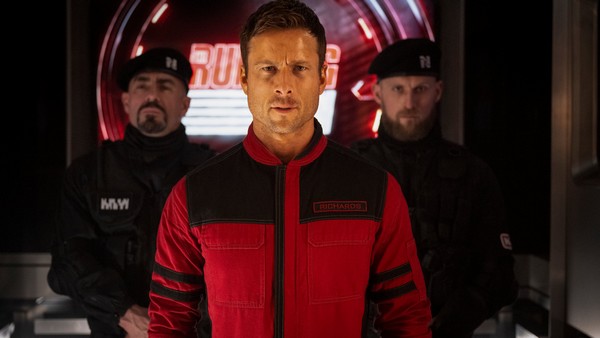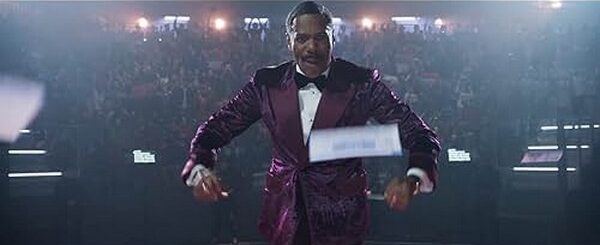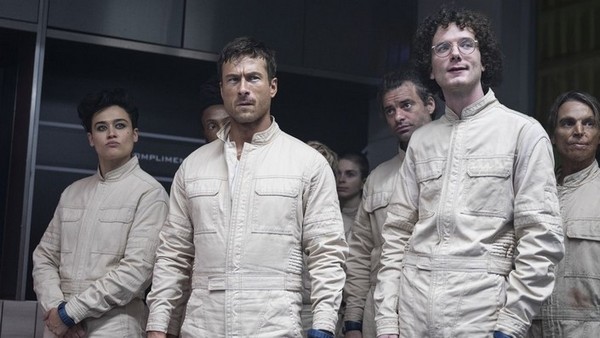 A desperate man tries to stay alive for 30 days while being hunted in Edgar Wright’s lacking The Running Man, adapted from the Stephen King novel.
A desperate man tries to stay alive for 30 days while being hunted in Edgar Wright’s lacking The Running Man, adapted from the Stephen King novel.
Lately, it seems like “another week, another Stephen King review.” Okay, that’s true with the currently running Welcome to Derry weekly posts. But it has been a big year for King adaptations. It nearly always is; the man is prolific, and people come out to see his flicks and watch his shows consistently. But with The Monkey, The Institute, Derry, and Life of Chuck already released this year, what’s one more? Two really: The Long Walk in September was also published as Richard Bachman in 1979, and shares themes with 1982’s The Running Man: in a messed-up future, people join murderous games to try to get set for life. Interesting that two similar-themed, but wildly different in tone and method, films releasing so close to one another.
The Running Man was previously adapted by Paul Michael Glaser in 1987. Starring Arnold Schwarzenegger, it’s honestly not a great movie, but one beloved by a generation anyway. It strayed from the source, keeping the basic concept but springing off in a different way to execute it. Now, in 2025, geek film god Edgar Wright picks up the game and does his thing with it. Anyone reading this site knows Wright’s filmography, so I’m not going to do a “who’s this guy, just in case ya forgot” but I will say he’s always been an energetic filmmaker, with a musical sense of beat to how he puts things together, a keen visual sense, and sharp satirical scripts. Hot Fuzz remains one of my Top Ten flicks. It’s perfect. For the Greater Good (THE GREATER GOOD), he’s remained a strong working filmmaker. I know it got mixed responses from audiences and critics, but I wholeheartedly love Last Night in Soho.
Taking over for Schwarzenegger as Benjamin Richards is Glen Powell. Powell is one charming mutherfucka. He exudes charisma, and I can’t help but like him in everything, with that easy smile and sheer likability. Twisters, Top Gun Maverick, he’s the best thing in Scream Queens, and Anyone but You. He’s an actor I’ve enjoyed watching rise. Like Brad Pitt, he seems to be the “character actor in a leading man’s body” sort of thing.
 Unfortunately, even with a favorite filmmaker adapting a favorite author (Wright shares writing credit with Michael Bacall, hewing much closer to the source), featuring a not-favorite but well-appreciated actor, The Running Man trips up. It saddens me to say The Running Man doesn’t work, becoming a stretched, undercommitted chase, wearing out its welcome before it trips, hard, while approaching the finish line. It’s extraordinarily sloppy for Wright, known for keeping a very tight control over his films. The Running Man misuses just about every avenue the viewer can dig into: the direction, the script, and the actors. It isn’t all bad; for all the ranting and raving found here, it’s ultimately more of a “meh”. A fascist, entertainment & screen-forward world, of corporations taking over more and more, will sadly always be relevant, and the basics of the plot are enough to keep invested (even if it comes shallowly in the film). The body is nice, but the clothes draped over it are ugly and ill-fitting.
Unfortunately, even with a favorite filmmaker adapting a favorite author (Wright shares writing credit with Michael Bacall, hewing much closer to the source), featuring a not-favorite but well-appreciated actor, The Running Man trips up. It saddens me to say The Running Man doesn’t work, becoming a stretched, undercommitted chase, wearing out its welcome before it trips, hard, while approaching the finish line. It’s extraordinarily sloppy for Wright, known for keeping a very tight control over his films. The Running Man misuses just about every avenue the viewer can dig into: the direction, the script, and the actors. It isn’t all bad; for all the ranting and raving found here, it’s ultimately more of a “meh”. A fascist, entertainment & screen-forward world, of corporations taking over more and more, will sadly always be relevant, and the basics of the plot are enough to keep invested (even if it comes shallowly in the film). The body is nice, but the clothes draped over it are ugly and ill-fitting.
Maybe my expectations were too high for Edgar Wright’s direction. It doesn’t feel like him at all. Where’s the music? Where’s the energy? His films, even when not playing his great ear in needle drops, have the zip of listening to a great song and bobbing your head. He has an eye for the look and an ear for the unheard beat. Someone check Darren Aronsphsy’s basement, he seemed to steal Wright’s essence with the bop of Caught Stealing, finding the musical beat present in that crime caper, especially since Running Man is generally a blandly shot action piece. A few moments of the Wright style break through here and there, but most feel director-for-hire, everyday set-ups. And more than a few descend into a silly eye-roll of a sequence. All the more sad is Running Man is a movie set to move; with Richards trying to stay ahead of assassins, professional and amateur, for 30 days to win his money and family safety. It should run (hell, it’s the title), but it is so dully paced. There’s a lot of fluff; the 138 minutes are felt. For that length, one would think they’d be better than the half-assed, annoying, incomplete world-building.
I get Wright can’t lean into the normal set-up and payoff mastery we’re used to on the page; he’s confined to the King novel, but this script doesn’t do any favors. So much forced exposition; the film literally stops in its tracks a few times to do some short-cut world-building; giant info dumps to explain what it doesn’t show, or starts to show in a few ways but is abandoned (the direct divide of rich and poor, physically, is a big deal until it isn’t). The dialogue feels first draft, to be finessed outside of bluntness later. The capable stable of actors do their best to make it work, with varying degrees of success. But you can hear the disdain when forced, in a decidedly anti-capitalist film, to grossly hawk real products like Liquid Death and Monster Energy Drinks. This so-on-the-nose advertisement screams producer demanded inclusion, which makes one wonder how much of this is actually Wright’s, rather than a powerful suit forcing his hand. With some very “hey look at this” King and previous film references, such as Schwartneegger on the money or literally using Derry, Maine as a setting, it just may well be more the Powers That Be over Wright; but it’s name on the credits, so gotta go there.
As charming as he is, Glen Powell is terribly miscast. Similar to the bulking mass of Schwarzenegger undid the everyman aspect of 1987’s film, his strikingly chiseled face is very hard to miss, even in lesser forms of his Hitman disguises. He emits a “look at me” energy; you can’t look away. But more to it, he’s continually described as “the angriest man.” That is not Powell, we’re told; we see him, but Powell can’t play angry convincingly. At all. He’s more than capable with the action bits, yes, but the main facet to the character? No.
The awesome cadre of character actors surrounding Powell generally does what they can. William H. Macy, giving soul to Train Dreams (seek it out now), barely musters energy for his two scenes. Lee Pace mostly stands around, but gets his moment to shine. At least Coleman Domingo and Josh Brolin lean in hard to eating all the scenery as show producer Killian and Running Man host Bobby T, respectively. Michael Cera does get a good run, a shining brightness for his bit, outside a joke set-up/pay-off that crashlands.
Perhaps worst of all: the always awesome, the great up-and-comer Katy O’Brian is shrugged away after a setup. To have such a talent and squander her like this is emblematic of the film.
The Running Man is more disappointing than it is bad. For all my grousing, there’s something inherent within to make it absolutely watchable. But I can’t help feeling it squandered the potential of the world-building, characters, and the actors. But most of all, reducing one of today’s most distinct voices to a bland action director. It’s fully competent, but ultimately lacking.
